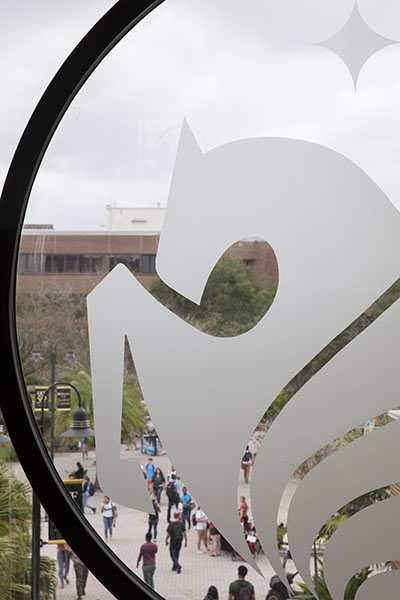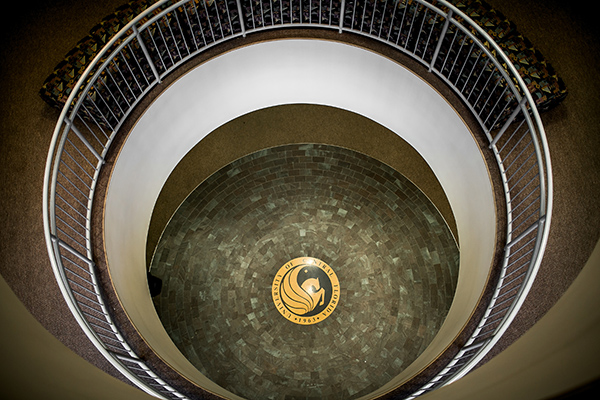CS PhD Program and Curriculum
The Computer Science Ph.D. program produces professionals trained at the highest possible academic level in the theory and practice of Computer Science in order to meet current and projected market demands for Computer Science experts. CS Ph.D. students from the Department of CS at UCF graduate with proven abilities in research and instruction and have expertise suitable for positions in industry, academia and government.

Students in the program receive a broad background in the areas of programming systems and languages, computer architecture and computer science theory while specializing in a research area. Research interests of the computer science faculty include affective computing, applied perception, bioinformatics, computational biology, computational geometry, computer and network security, computer architecture, computer forensics, computer graphics, computer networks, computer vision, cryptography, data compression, database management systems, data mining, design and analysis of algorithms, evolutionary computation, genetic algorithms, graph theory, hardware/software co-design, image processing, machine learning, mixed and virtual reality, mobile computing, modeling and simulation, multimedia systems, natural language processing, neural networks, parallel and distributed processing, performance evaluation, programming languages, quantum computing, semantic web, software agents, software engineering and VLSI systems.
PhD Curriculum Requirements
- A total of at least 72 semester hours of credits at the 5–7000 level. At least one half of these must be 6–7000 level and none can be undergraduate credit.
- CDA 5106, COT 5405, and COT 6410, all with a grade of B (3.0) or better.
- A total of at least 36 credit hours of CS or ECE coursework (Prefixes CAP, CDA, CEN, CIS, CNT, COP, COT, EEE, EEL, and ECM) and excludes Independent Study/Doctoral Research/Dissertation credits.
- At least 15 credit hours of Dissertation (CXX 7980).

Application Deadlines
Fall Priority: Jan 15
Fall: Jul 1
Spring: Dec 1
Summer: Apr 1
Fall (MS Applicants): Jan 15
Fall (Ph.D. Applicants): Dec 1
Spring: Jul 1
Summer: Nov 1
Fall Priority: Jan 15
Fall: Mar 1
Spring: Sep 1
Summer: Dec 15
*Applicants who plan to enroll full time in a PhD degree program and who wish to be considered for university fellowships or assistantships should apply by the Fall Priority date.
Plan of Study (POS)
No course can be on a plan of study with a grade below 2.0. At most two courses can have a grade below 3.0. No coursework can appear on a POS that is more than 7 years old at the time of graduation.
The initial POS must be filed prior to the completion of 9 credit hours after admission to the program. This is mandatory! The College of Graduate Studies automatically places a “hold” on future registration for non compliance. The POS can, and usually will, be revised later to reflect changes in the courses actually taken, but it is crucial that a POS be on file, signed by the student and faculty advisor, and approved by the Graduate Program Coordinator. Any variation from the current POS must be approved by the advisor and Graduate Program Coordinator and then immediately reflected in an updated POS.
The POS is flexible and unique to each student. However, it must meet university, college, and department rules for minimum number of hours, etc. (see Program Requirements, above). The final POS must be completed, submitted, and approved before the student will be allowed to register for dissertation hours (CXX 7980).
Explore Further

Transfer of Credit
If a student has an earned MS degree in CS, or a related area, they may, with the approval of the advisor and graduate coordinator, transfer up to 30 credit hours of actual coursework hours into the POS (no Independent Study or Thesis credit). This can occur after the initial POS, but must be approved prior to entering candidacy status.
In no case can courses with a grade below a B (3.0) be transferred, nor can undergraduate credit.
Explore Further

PhD Milestones
After a student has been admitted into the PhD program and has a research advisor, there are several points in their academic career that require special attention. We cover these in more detail in the following.

CS PhD Candidacy
Forms Required

External members of dissertation advisory committee are often not appointed until after the student has entered candidacy. By general University guidelines, a student and his or her dissertation advisory committee must formally convene for the committee to appraise the student’s progress at least once per calendar year.
All transfer of credits, grade changes, and incomplete grades must be resolved prior to entering candidacy status.
Upon entering candidacy status, students must be registered continuously (including Summer) as full-time students until graduation. Students in candidacy status are considered “full-time” when enrolled in 3 credits of CXX 7980, Dissertation.

CS PhD Dissertation Proposal
All PhD students must write a dissertation. Please visit UCF Thesis and Dissertation. This must be preceded by an oral presentation of a written dissertation proposal, which, in turn, cannot occur until a term after admission into candidacy status. The purpose of the written proposal, given to members of the research committee at least two weeks prior to the presentation, is to show the student has sufficiently explored the literature of a significant research problem in computer science to be able to embark upon solving that problem. The written proposal should detail a proposed methodology and plan for undertaking the research work, and its completion. Rules governing the proposal announcements, scheduling and committee attendance can be found in the UCF Graduate Catalog.
The oral presentation of the proposal is open to the public and must be announced at least two weeks prior to its occurrence. The presentation should last approximately 45 minutes to an hour, and it should show the student is aware of the background, has a good idea of the problem being attacked, and has a reasonable plan for carrying out the research. The committee’s role is to assess the significance of the proposed problem, the feasibility of the proposed solution, and to offer advice.
The proposal is not “cast in stone.” It is a proposal. The research may change direction as new information is uncovered. That is perfectly acceptable and expected. Of course, if the direction of the research becomes too “off target” a new proposal should be considered. This is at the discretion of your advisor, committee, and the graduate coordinator.
CS PhD Dissertation Defense
“The dissertation consists of an original and substantial research study designed, conducted, and reported by the student with the guidance of the Dissertation Committee. The written dissertation must include a common theme with an introduction and literature review, details of the study, and results and conclusions prepared in accordance with program and university requirements. The dissertation is expected to represent a significant contribution to the discipline. Since this work is original, it is very important that care is taken in properly citing ideas and quotations of others. Failure to do so is academic dishonesty and subject to termination from the program without receiving the degree. An oral defense of the dissertation is required.”
Forms Required

Students are responsible for being completely aware of the rules and regulations in the “UCF Thesis and Dissertation Manual” which can be obtained from the link given above. Once the dissertation is in its final stages, it must be submitted electronically to the UCF “Turnitin.com” system for format approval. Then, again, two weeks prior to the defense, for a check of originality (i.e., don’t plagiarize – it will get you).
As with the proposal, the defense is announced and open to the public. Furthermore, the defense cannot be scheduled in the same term as the proposal. Please see UCF Thesis and Dissertation.

CS PhD Synopsis
- Admission into the PhD program
- File an initial Plan of Study (By the 9th credit hour)
- Obtain an advisor
- Qualifying Review (Between 19th and 37th credit hour)
- Form a Dissertation Advisory Committee
- Candidacy (Paper acceptance)
- Dissertation Proposal
- Dissertation Defense
Graduate Contact Info
Questions and Appointments
Jeanine Clements
Phone: (407) 882-2313
Email: csgrad@ucf.edu
Advising and Approval
Dr. Wei Zhang
Phone: (407) 823-2638
Email: csgrad@ucf.edu



